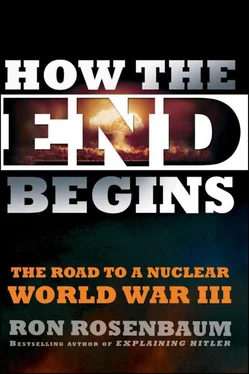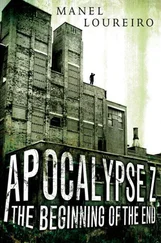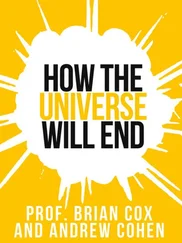An “esoteric morality?” I asked him.
“You construct the principle where you say ‘Well I’m not going to use these weapons [to retaliate] because I’m not going to save my life by killing innocent people, but I shouldn’t tell it to the enemy because this [the threat of use] is the only thing that would protect me.’”
“Shouldn’t tell it to the enemy”? Isn’t he doing just that? Not really: he’s not an official representative of the Israeli government. He says he’s not been involved in official discussions of nuclear ethics. And yet he’s not entirely unofficial. He did, after all, co-author the IDF code of ethics and it is the IDF, the Israeli military command, that controls the nuclear weapons capacity everyone knows they have, although they won’t admit because of nuclear ambiguity.
So he is casting ambiguity on ambiguity? A veil over a veil? A fence around a fence? The entire notion of an “esoteric strategy” [241]—the idea that secretly, esoterically, we don’t plan to retaliate, at least as Halbertal defines “esoteric strategy” here—something I’ve been reading reference to for decades (recall Thomas Schelling’s parenthetical remark, “Why retaliate once you are wiped out?”) seems more of a construct to make nuclear ethicists feel comfortable with allowing the morality of threatening deterrence without having to weigh as heavily the likelihood that the deterrent threat would be carried out.
The response of the British Ministry of Defence to my inquiry about the Letter of Last Resort discussed in an earlier chapter seems to bear on this: there is no ambiguity in what the Ministry of Defence thinks the letter will say. The Ministry of Defence believes it will ensure retaliation should the submarine be cut off by a “bolt from the blue.” The ministry seems to believe the letter removes ambiguity about retaliation when in fact to most it seems to introduce ambiguity. But the official position is certainty. The American missile crewmen I talked to devised the spoon-and-string workaround to be sure they would not be prevented from launching a genocidal retaliatory attack by some crewman turning peacenik.
Of course there has always been, always will be ambiguity. The point is that no enemy can be certain that they will not be obliterated in retaliation for a major strike by those following well-established orders. It’s unlikely a foe contemplating a surprise attack is going to rely on the existence of an esoteric strategy (if there ever was one).
Halbertal’s doctrine, his thinking on these questions, always returns to the principle of distinction—distinction between military and noncombatant casualties of a military operation—and the way nuclear weapons obliterate the distinction. “The principle of distinction has to stay firm even in moments of supreme emergency. I cannot see a world in which you are allowed to actually kill an innocent person intentionally. I cannot see a world where that is allowed.”
“But you must be allowed to threaten it?” I asked him.
“Okay, then it must be allowed to threaten to do this in order for the other side not to do the same.”
“And also you must not reveal to the other side that you will not carry out the threat?”
“Exactly, and so with Walzer we talk about this kind of esoteric morality. But, and here, that’s where my doubts begin with Walzer. And it brings me to paradoxical thinking. There is a way in which the aim of a nuclear attack is to destroy the capacity of collective action of the other side.”
I wasn’t sure what he was getting at exactly. But then he made it specific when he dropped what I regard as a kind of bombshell for an ethicist: “allowing” a preemptive nuclear first strike in certain circumstances.
“Are you talking about a retaliatory attack or possibly even preemption?” I asked him.
“Even preemption,” he said.
I found the fact that Halbertal was making an argument in favor of nuclear preemption a little shocking.
I asked him to elaborate and he said, “Let’s play out the case of Israel because my thinking now is about Israel. There is, I can see that there is a real threat of nuclear attack on Israel if Iran does get nuclear weapons. I think it a serious problem. They talk about the destruction of Israel and also they might well be outsourcing them and giving them to Hezbollah, it’s hard to know what we have here, but it’s very problematic. Now Israel can be wiped out with one or two bombs. It’s very small. You hit its center, you hit Tel Aviv and the area, there’s no Israel.”
Then he adds another somewhat shocking remark: “I am against—strangely enough—I am against retaliation.”
“Really?” It was a remarkably definitive and unexpected declaration coming almost out of context. It was one thing hearing it from a grad student in a Yale seminar room but from one of the writers of the Israeli military code of ethics…
“Israel is gone,” he says, beginning to elaborate a scenario. “And let’s say we have submarines, and I imagine that we do have, we must have them, strategically, because they [hostile nations] have to have a feeling that we can retaliate even if Israel was destroyed.”
“Right,” I said, wondering where this was leading, which was to a reiteration, almost an incantation.
“I am against retaliation. I don’t see the point in retaliation. But I can see a preventive strike.”
Not that he doesn’t have doubts.
“My doubts about possible preemptive strikes have to do with the following, and I’m saying it after I claim that I am against intentional killing of civilians in emergencies. So I’m working within the two moral boundaries that I have: first of all I am against retaliation, second I am against the collapse of the principle of distinction in supreme emergency.
“And yet I have doubts about a preventive nuclear strike—not whether it would be a good thing or not a good thing [in other words it can never be a good thing] but whether it might be necessary and justified.”
I’m tempted to say: Wow! I was fascinated following his thought process though horrified at where it seemed to be leading. I remember at this point in the conversation I nervously stopped my tape recorder to make sure I was getting all of this, something that I usually hate to do, then when I started it up I pushed it closer to him. He didn’t seem fazed.
“So the preemption issue is the following,” he said. “There might be a situation in which the only way to prevent a nuclear attack on Israel will be to destroy the Iranian state. By that I mean to destroy its capacity to act like a state. And here it would be a very strange thing to say, but it’s a case almost of a collateral killing of civilians. It’s not aimed at innocent civilians, it’s not Hiroshima or Nagasaki. It might be either aimed at nuclear laboratories, factories, reactors whatever they have. Or the state apparatus that is necessary for ordering and forming such a thing.”
Should such matters even be open for public discussion? Or was this public discussion a kind of warning, a preemptive admonition to those who need to listen up: that Israel’s leading ethicist could find grounds, if not the precise threshold, to justify a preemptive nuclear attack. Don’t give them grounds, don’t approach that threshold. Halbertal, a revered ethicist, giving his blessing however ambiguous or esoteric to a preemptive strike: almost like a mullah blessing a “martyrdom action” in which children will die. Could he have meant it to send an admonitory message, one that might perhaps make such action unnecessary? Perhaps it will just add another layer of ambiguity.
I decided to ask Halbertal about Israel’s nuclear “opacity,” the refusal of Israel to admit officially that it had nuclear weapons. The carefully worded, scarcely plausible statement by the Israel Ministry of Defense that “Israel would not be the first to introduce nuclear weapons” into the Middle East. [242]This has often been decoded to mean, at best, a situation in which not all components of Israeli nuclear weapons had been joined together, although readiness to fire was a few bolts and a few minutes away, for an arsenal most estimated at some two hundred warheads ready to “introduced.” Not counting the ones on subs.
Читать дальше











